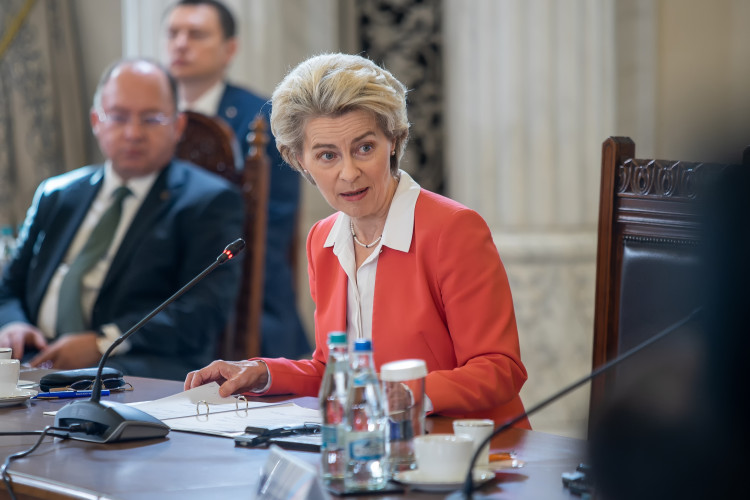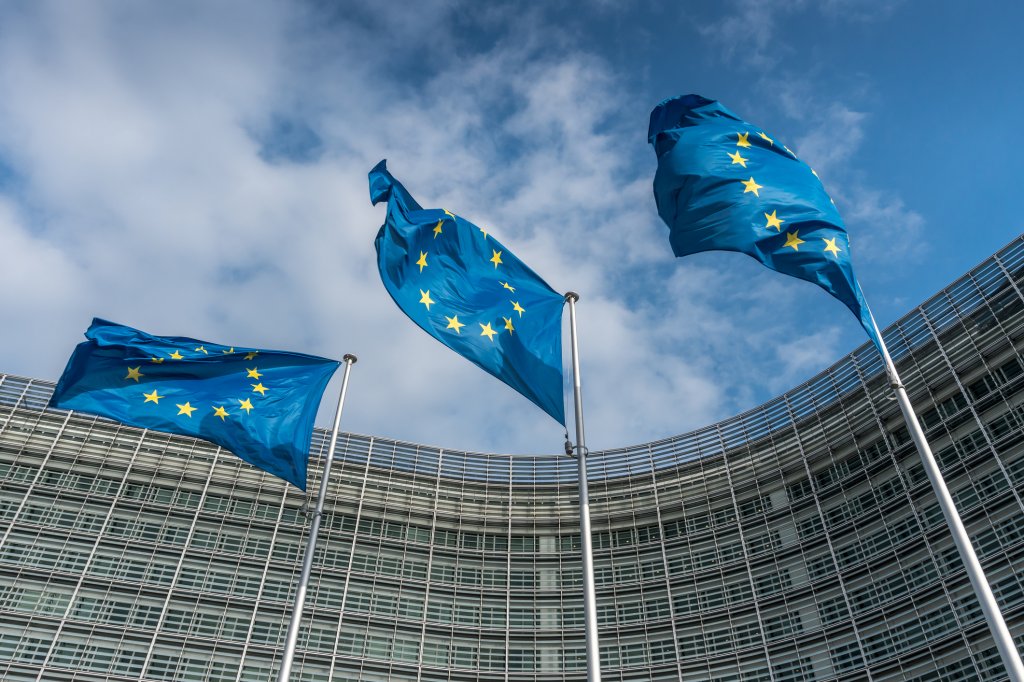When a landmark bill was passed in the US in 2022 to attract massive investments for the green transition, the EU had to face up to the challenge of saving its economy from the threat of de-industrialisation.
Wake-up call
The European Union appears to find itself in a perpetual state of crisis amid the war in Ukraine, soaring energy prices fuelling inflation levels of over 10%, and the fallout from the COVID-19 pandemic. And yet, Europe now faces another challenge: how to save its economy from the threat of de-industrialisation after its main trading partner and principal security ally, the United States, introduced a landmark bill to attract massive investments for the US green transition.
In August 2022, the Biden Administration passed a reduced version of the Build Back Better Act through Congress. The toned-down tax and climate bill, incorrectly named the Inflation Reduction Act (IRA), offers to “lower energy costs for families and businesses, accelerate private investment in clean energy solutions, strengthen supply chains, create good-paying jobs and new economic opportunities for workers.” With a budget of 369 billion USD, the US is rolling out the ‘green carpet’ for investments and has fully embraced the climate transition.
The IRA immediately set off alarm bells in EU capitals. The US’ pledge to become the global leader in clean energy technology, green manufacturing, and innovation risks diverting green investments away from the Old Continent. The US will dole out tax credits for carbon capture and storage. Grants and public aid will help industrial manufacturing lower their emissions, including for chemical, steel, and cement plants. Financial incentives are to be distributed for hydrogen energy coming from clean sources, biofuels, and sustainable aviation fuels. And, perhaps most noticeable for the EU, tax credits of up to 7,500 USD are foreseen for the purchase of electric vehicles.
While talks of de-globalisation are largely confined to academic spheres, the ‘America First’ narrative and the IRA’s economic ramifications are all too real for European companies. The style is different, but the underlying objectives are not. The Biden Administration, like the Trump Administration before it, is set on protecting American workers and rebuilding American industry under the ‘Buy American’ banner. Anyone doubting this assertion should listen to the US President’s 2023 State of the Union address.
Green deal industrial plan for a net-zero age
The unfavourable economic climate has compelled the EU executive to respond to the danger posed by the IRA. In a speech at the World Economic Forum in Davos in mid-January, Commission President Ursula Von der Leyen laid out the Union’s answer to both the US IRA and the energy crisis.
Short of a grand revival of industrial policy, the EU’s ‘Green Deal Industrial Plan for a Net-Zero Age’ (GDIP) seeks to “provide a more supportive environment for the scaling up of the EU’s manufacturing capacity for the net-zero technologies and products required to meet Europe’s ambitious climate targets” under the umbrella of the EU’s wide-ranging ‘Green Deal’ policy package. The plan is based on four pillars: a predictable and simplified regulatory environment, speeding up access to finance (including by reviewing the EU’s State aid rules), enhancing skills, and open trade for resilient supply chains.
The EU’s response is also part of a broader push for European strategic autonomy, as championed by French Commissioner for the Internal Market, Thierry Breton, and his allies in Paris. The growing realisation, including the mea culpa from the German Chancellor, is that Europe is today paying the price for its overreliance on Russian energy sources. Defined as the capacity of the EU to act autonomously, proponents of a more sovereign Europe have vowed to reduce external dependencies on energy, raw materials and even technologies.
More or less state intervention
Following the GDIP’s announcement, the European Commission presented amendments to the so-called ‘Temporary Crisis Framework’ that would allow European Member States to grant public aid to fast-track the green transition. Aware of national sensitivities, the Commission has started an intensive consultation period with EU capitals to counter the perception of a renewed subsidy splurge. Concrete proposals will be worked out by mid-March 2023.
In a nutshell, the Commission intends to address market failures with targeted and limited loosening of State aid rules. Simplified rules that already apply to some renewable technologies will be extended to renewable hydrogen and biofuel storage. Changes to the rules will be temporary (likely applicable to the end of 2025) and will limit the amount of public aid to be disbursed.
Concerns of an EU-wide subsidy race, however, have prompted Denmark, Finland, Ireland, the Netherlands, Poland, Sweden, Czechia, Hungary, Latvia, and Slovakia to “urge the Commission to exercise great caution in making fundamental changes to EU State aid rules. […] State aid for the mass production and commercial activities can lead to significant negative effects including the fragmentation of the internal market, harmful subsidy races and weakening of regional development”.
EU decision-makers are well aware of the risks to the unity of the Single Market, the crown jewel of European integration. Access to the EU unified market, which this year celebrates its 30-year anniversary, offers the EU its punching power, wielded in the exclusive EU policy fields of trade and competition on the international scene. However, the solutions under discussion to avert market fragmentation do not have support from across the board. The Commission will first look to redirect capital from existing European funds. In a second phase, plans will be made to set up yet another European financial vehicle, the European Sovereignty Fund, which would specifically address national differentials in fiscal firepower and keep the internal market peace.
Both on State aid and EU financing, two camps have emerged on the European scene. One side, spearheaded by Executive Vice-President and Competition Commissioner Vestager, and accompanied by several small(er) Member States such as the Netherlands, Denmark, or Czechia, opposes any move towards massive subsidies and new EU funding. The other side, led by Internal Market Commissioner Breton, and prominently figuring France, is in favour of loosening State aid rules and finding new means of funding, including through common EU debt. No major surprises here for experienced EU observers.
Close attention should also be paid to two Member States with the potential to tip the scales either way. There is an apparent dichotomy in Germany and Italy’s positions on the industrial plan. Italy is a staunch advocate of common EU funding to boost the green industry, including through the European Sovereignty Fund, but rejects proposals to relax State aid rules for fear of being financially outgunned by Germany. Although German Chancellor Scholz, a Social-Democrat, seems open to the idea of reviewing rules on public aid, his Liberal Finance Minister and heralded (or vilified) gatekeeper of EU finances, Christian Lindner, has expressed concern about any excessive extension of subsidies in the EU and ruled out fresh EU money.
Verdict
Biden’s IRA reopened old dividing lines in the EU between traditional free traders and proponents of a state-led economy. These divisions were less apparent during the COVID-19 pandemic when there was broad agreement on the need for measures to keep companies afloat. Despite the resurgence of these disagreements, EU Leaders agreed at their Special European Council on 9 and 10 February 2023 to make: “procedures simpler, faster, and more predictable, and to allow for targeted, temporary, and proportionate support to be deployed in those sectors that are strategic for the green transition and are adversely impacted by foreign subsidies or high energy prices”. Unsurprisingly, the EU will need to find a balance on what is meant by ‘targeted, temporary and proportionate’.
The need for consensus in the EU is unlikely to make GDIP a major game changer for Europe, at least in its (very) early form. The EU will look to extend largely existing exemptions to State aid rules under the Temporary Crisis Framework, redirect existing funds, and aim to cut red tape in the EU to boost green investments. Tax incentives remain a Member State competence. Relaxing State aid rules does not automatically imply that national authorities will, or are even able to, disburse more tax-payers money than before.
Going forward, it will be in the European industry’s interest that the fundamentals of sound economic policymaking guide the Commission and Member States’ approach to GDIP. With the right regulatory environment and facilitated movement of capital and skills across the EU, the Old Continent might still be able to respond to what many companies in Europe see as a more efficient, targeted, and straightforward US IRA. Rise and shine Europe; work has only begun.










